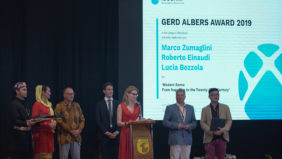 Gerd Albers Award (GAA) was established in 1999 in honor of professor Gerd Albers, a co-founder and past president of the Society, who placed a particular emphasis on the task of publishing as a means of elucidating both the current debate and practical achievements in the planning field. This reputable award is bestowed for the best publication (book, book chapter, journal article and/or published project report) of the ISOCARP members.
Gerd Albers Award (GAA) was established in 1999 in honor of professor Gerd Albers, a co-founder and past president of the Society, who placed a particular emphasis on the task of publishing as a means of elucidating both the current debate and practical achievements in the planning field. This reputable award is bestowed for the best publication (book, book chapter, journal article and/or published project report) of the ISOCARP members.
In 2019, in total nine GAA entries of high academic standards covering a range of topics of wide professional appeal were submitted – three books, two book chapters and four journal articles:
- Peri-Urban China: Land Use, Growth, and Integrated Urban–Rural Development, by Li Tian and Yan Guo
- Modern Rome: From Napoleon to the Twenty-First Century, by Marco Zumaglini, Roberto Einaudi, and Lucia Bozzola (Eds.)
- Connecting Urban Policy Making and Implementation, by Mennatullah Hendawy
- Collaborative student and community design in a time of climate change: Planning a flood resilient waterfront in New Zealand, by Xinxin Wang, Matthew Bradbury, Lucia Camargos Melchiors, and Hugh Byrd
- Data Protection Law and City Planning: Role of Open Data in Climate Resilience and Governance of National Capital Territory of Delhi, India, by Mahak Agrawal
- City centres in the Paris metropolitan area, by Christian Horn
- On Big Data, Artificial Intelligence and Smart Cities, by Zaheer Allam and Zaynah Dhunny
- Assessing transformative capacity for sustainable urban regeneration: A comparative study of three South Korean cities, by Marc Wolfram
- Aspirations and realities of polycentric development: Insights from multi-source data into the emerging urban form of Shanghai, by Tianren Yang, Ying Jin, Longxu Yan, Pei Pei
The jury composed of the Scientific Committee members – Ernst Drewes (South Africa), Eric Huybrechts (France), Benjamin Scheerbarth (Germany), Hongyang Wang (China) – as well as Ana Peric (Switzerland) as the ISOCARP Director for Awards and the jury president, decided on the winners as follows:
GAA ‘Best Book’:
Marco ZUMAGLINI, Roberto EINAUDI, and Lucia BOZZOLA (Eds.), Modern Rome: From Napoleon to the Twenty-First Century.
Depicting and explaining the development of the “modern” Rome – from the Napoleon’s urban planning laws in 1811 until the contemporary urban development, the book provides in-depth, informed and comprehensive insight into the complex socio-political, cultural and economic conditions that shaped spatial reality, in the same time leading the reader through the phases of Rome’s urban history with astonishing ease. Strongly supported by the classic work of Italo Insolera, one of the leading scholars in historical urban studies, this masterpiece illustrates the growth of the modern Rome with precious detail, pointing to both successful saving of its past from destruction, as well as the elements of chaotic urban growth. Accompanied with substantial graphic material, glossary of urban planning terms, and historical overview of institutional framework, by reflecting on the past episodes of Rome’s urban planning, the book also provides the guidelines on future urban development crucified between the need for heritage protection, challenges of multiethnicity and trends of global capitalism. Written in a language free of professional jargon, the book is a valuable reading material for the professionals, academics, and decision-makers, as well as laymen interested in the recent history of the eternal city.
GAA ‘Best article’:
Marc WOLFRAM, Assessing transformative capacity for sustainable urban regeneration: A comparative study of three South Korean cities.
Using urban regeneration as a key tool for achieving sustainable development, the paper goes beyond the usual analysis addressing its main pillars – society, economy and ecology. Underpinned by the practical evidence that is hardly in line with sustainable transformation, the paper genuinely addresses the main preconditions, i.e. the capacity of preparing for, initiating and steering sustainable transformation. The core value of the paper is in its original and comprehensive methodological approach that enables empirical assessment of transformative capacity, which is rarely addressed in contemporary research. Consistently implementing the methodological model on three South Korean cities, the author concludes with universal findings on collective visioning, intermediation, community empowerment and repositioning science as instant drivers towards sustainable urban regeneration.
GAA ‘Special mention’:
Li TIAN and Yan GUO, Peri-Urban China: Land Use, Growth, and Integrated Urban–Rural Development.
The book revolves around the currently underrepresented research topic on the growing fragmentation of rural landscape in China. More precisely, the book explores how bottom-up rural industrialisation affects land-use patterns and dynamics in peri-urban areas, known also as extended metropolitan regions or ruralopolises. Against the theoretical background of new institutional economics, the book offers a historical account of institutional context in China, placing an emphasis on recent land-use policy changes in favour of peri-urban growth. Combining case study research with quantitative methods, the book provides interesting findings on compact urbanisation and integrated urban-rural governance, relevant not only for China, but also for academics, public administration and practitioners in other countries faced with the problem of peri-urbanisation.
Congratulations to the winners and a big thank you to all authors who submitted a book or an article. We look forward to successful GAA submissions the next year, too.